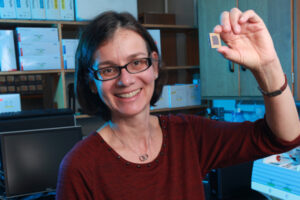Dr. Raymond Kim co-led the development of 18 recommendations to improve outcomes for Lynch Syndrome, a condition that increases the risk of multiple cancers.
Experts in cancer, genetics and medicine came together with patient partners to publish evidence-based guidelines for managing Lynch Syndrome they believe can save lives across Canada.
Co-led by Ontario Hereditary Cancer Research Network (OHCRN) Head Dr. Raymond Kim, the Canadian Lynch Syndrome Working Group set out to improve testing and management of Lynch Syndrome, an inherited genetic mutation in the body’s mismatch repair (MMR) system that increases a person’s risk of developing cancer.
While Lynch Syndrome is the leading inherited cause of colorectal and endometrial cancers, it is not as widely understood as other cancer-causing genes like BRCA1 and BRCA2. This lack of awareness contributes to inconsistent practices around when to test for Lynch Syndrome, and what actions to take once Lynch Syndrome has been diagnosed.
The Canadian Lynch Syndrome Working Group consisted of 37 experts, including geneticists, genetic counsellors, oncologists and patient representatives. After reviewing evidence and conducting a clinical survey, they came to consensus on 18 wide-ranging recommendations that were published in the Journal of Medical Genetics.
Key recommendations include universal Lynch Syndrome screening for people with colorectal and endometrial cancers, genetic testing for family members of people with Lynch Syndrome, and the creation of provincial surveillance protocols for Lynch Syndrome-associated cancers.
“These recommendations could improve outcomes for people with Lynch Syndrome by finding cancer earlier or even preventing it altogether,” says Kim, a Clinician Scientist and Medical Geneticist at University Health Network’s Princess Margaret Cancer Centre, Sinai Health System and The Hospital for Sick Children.
Another of the group’s recommendations is for all Canadian jurisdictions to create a provincial/territorial registry of hereditary cancers, which is exactly what Kim has spearheaded with OHCRN.
OHCRN was created by OICR to build a centralized database on hereditary cancers in Ontario that can drive new discoveries to detect, diagnose and treat hereditary cancers. The Network’s participant portal will officially launch in November 2025.
Diagnosing and managing hereditary cancers have been a key focus for OICR in recent years. In 2023, Kim and OICR’s Dr. Trevor Pugh were part of a team that developed a blood test that can detect cancer in people with Li Fraumeni Syndrome — another cancer-causing genetic condition. Kim and Pugh are also part of the CHARM Consortium, which is exploring similar tests for people with Lynch Syndrome. Also in 2023, Kim and OICR’s Dr. Harriet Feilotter contributed to guidelines for hereditary cancer screening that were adopted into practice by Ontario Health.
For the new Lynch Syndrome guideline to be adopted into practice, Kim says the recommendations will need to be endorsed by provincial agencies and new infrastructure will need to be built. But he says implementing the recommendations would make a huge difference for people with Lynch Syndrome.
“This is an important opportunity to standardize care, improve equitable access and save lives,” Kim says.




